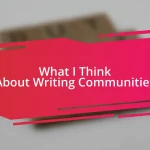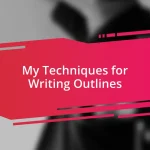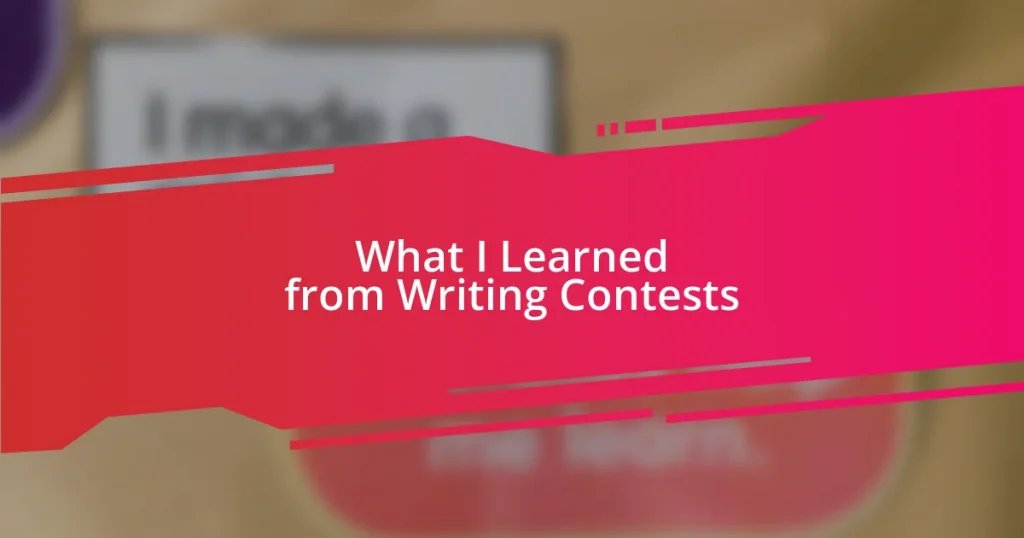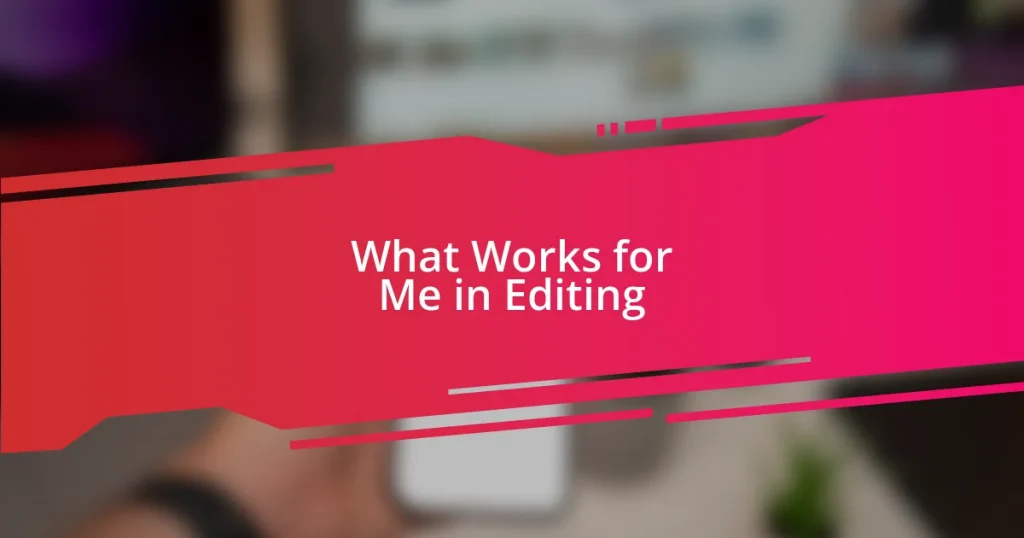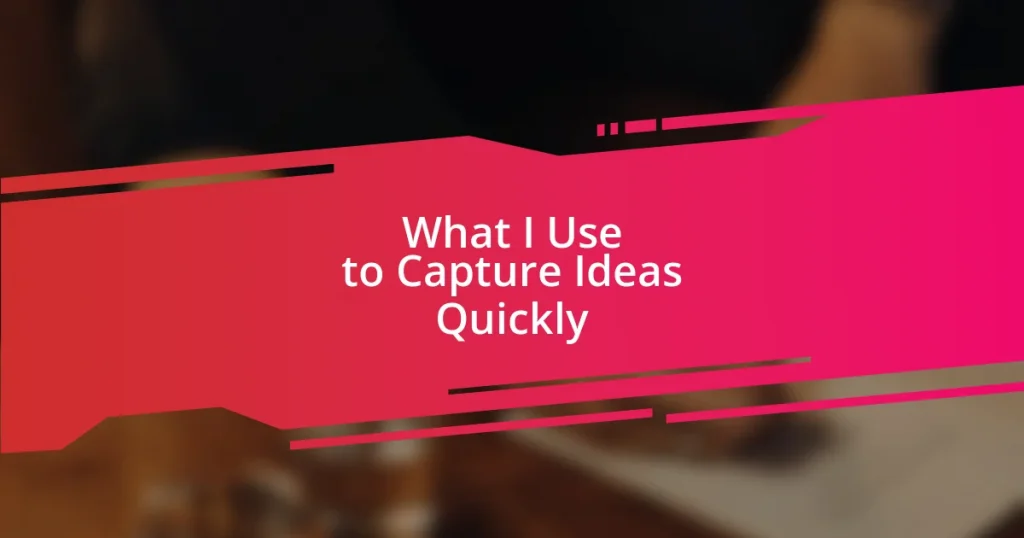Key takeaways:
- Participating in writing contests provides valuable feedback, encourages creative exploration, and fosters connections with a supportive writing community.
- Understanding and adhering to contest guidelines is crucial as it can prevent disqualification and ensures respect for the organizers.
- Continuous improvement in writing can be achieved through reflection, setting specific goals, and analyzing successful works from other writers.

Benefits of Participating in Contests
One of the most significant benefits of participating in writing contests is the opportunity to receive constructive feedback. I remember entering a local contest and, although I didn’t win, the judges provided insights that reshaped my writing style. Isn’t it fascinating how even a few words of critique can ignite a spark for improvement?
Additionally, contests often push you out of your comfort zone. I once tackled a genre I had never considered—a poetry competition that required me to express emotions I had bottled up. Can you imagine the thrill of stretching your creative muscles like that? It’s like discovering a new layer of your own voice.
Moreover, participating in contests can connect you with a vibrant community of fellow writers. I’ve met incredible individuals through workshops tied to these competitions, forming friendships that transcend mere rivalry. Have you ever felt that rush of camaraderie with others who share your passion? Those connections often encourage me to keep pushing my boundaries and sharpen my skills.
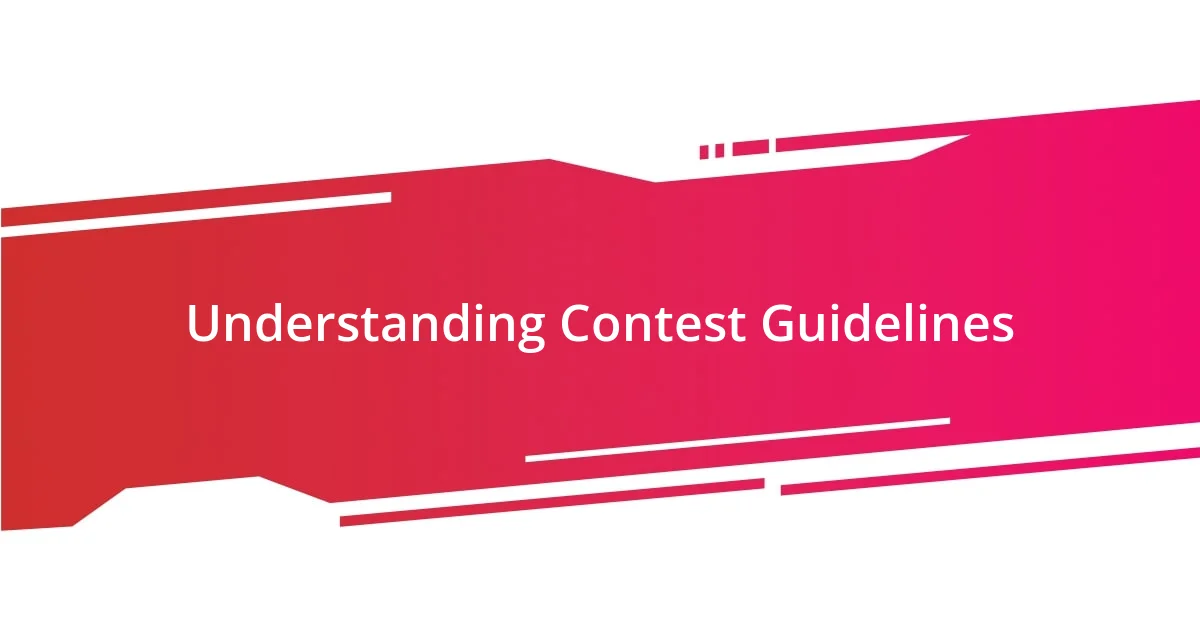
Understanding Contest Guidelines
Understanding contest guidelines can be daunting. When I first started entering competitions, I would skim through the rules, assuming I could figure it out later. However, I quickly learned that misunderstanding even a small detail could disqualify my entry. For instance, one contest required a specific formatting style I overlooked, leading to an unfortunate rejection.
I realized that the guidelines are there not just as rules but as a roadmap to success. Every contest has unique requirements, from word counts to submission formats. For example, I took part in one contest that allowed only previously unpublished work, which taught me the importance of reading guidelines thoroughly. It’s all about showing respect for the contest organizers and loading your entry with the best chances of being noticed.
To make the most of any contest, I now always create a checklist of the guidelines. This simple act of writing down the requirements helps me stay organized and ensures I don’t miss anything. What’s your process for managing contest submissions? I’ve found that being methodical reduces stress and elevates the confidence in my submissions.
| Key Considerations | Importance |
|---|---|
| Word Count | Ensures your piece meets length requirements. |
| Formatting Styles | Addresses the presentation of your work, often affecting readability. |
| Submission Guidelines | Specifies how to format and send in your entry, crucial for acceptance. |

Choosing the Right Contests
Choosing the right contests can be a game-changer for any writer. I once spent hours crafting a piece for a competition that turned out to be geared toward a completely different audience than I had anticipated. The experience taught me that aligning my work with contests that resonate with my voice and style is crucial. It’s about finding that sweet spot where my passion meets the contest’s theme.
Here are some essential criteria to consider when choosing contests:
- Target Audience: Understand who the contest is aimed at. Is it suited for emerging writers or established professionals?
- Themes and Genres: Select contests that match your strengths. Writing romance for a sci-fi competition could leave you feeling out of place.
- Judging Criteria: Look for contests that resonate with your writing style. Some prioritize creativity, while others focus on technical skill.
- Reputation: Research the contest’s past winners and its overall standing in the writing community. A reputable contest can offer impressive visibility.
- Prizes and Opportunities: Consider what the winners receive. Exposure, publishing opportunities, or cash prizes can greatly enhance your career.
Having these factors in mind streamlines the process and allows for more meaningful participation. I’ve found that thorough research into contests can transform them from mere competitions into exciting growth opportunities.
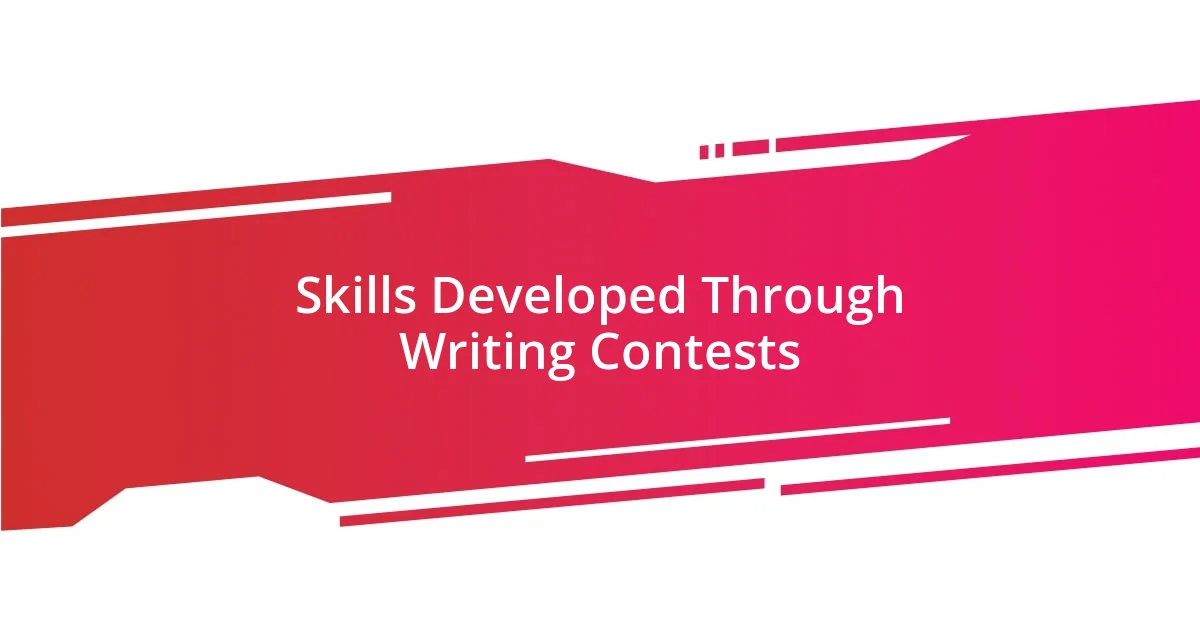
Skills Developed Through Writing Contests
Participating in writing contests has significantly sharpened my writing craft. I’ve discovered that deadlines inject urgency and focus into my process. For example, I once had only a week to submit a piece, which forced me to prioritize clarity and precision. Have you ever felt the adrenaline rush of a looming deadline? I realized that this experience not only pushed me to write more efficiently but also to embrace the challenge rather than shy away from it.
Another crucial skill I developed is adaptability. Each contest I’ve entered has presented different themes and formats, challenging me to step outside my comfort zone. I vividly remember a poetry contest that required a strict structural form I had never attempted before. Diving into that creative constraint helped broaden my abilities and opened my eyes to new writing styles. It got me thinking: how often do we limit ourselves by sticking to what we know?
Through feedback from judges, I’ve learned the value of constructive criticism. The first time I received insightful feedback on an entry, it felt like a mix of vulnerability and motivation. Instead of feeling discouraged, I was inspired to enhance my writing. Have you ever been surprised by the lessons hidden in critique? Embracing this feedback loop has turned my initial disappointment into an avenue for growth, allowing me to refine my voice and improve my craft continually.

Tips for Writing Contest Entries
When crafting your submission, one of the most impactful tips I’ve learned is to pay meticulous attention to the contest guidelines. Deviation from specified requirements, no matter how subtle, can lead to disqualification. I remember a time when I overlooked the word limit, thinking my story was too good to fit into that bracket. Turns out, that mistake cost me an opportunity. Has that ever happened to you? Clear adherence to instructions not only shows professionalism but also respect for the judges’ time.
Another key factor involves the opening lines of your entry. I’ve come to realize how vital it is to hook the reader from the outset. While working on a contest short story, I experimented with a shocking opening line that engaged not just the judges but also my own creative process. It really got me thinking: how can you capture attention right from the start? Opening strong establishes momentum, pulling your audience into the world you’ve created.
Lastly, I highly recommend seeking feedback before submission. Sharing drafts with trusted peers has always provided me with fresh perspectives. One memorable instance was when a friend pointed out a subtle plot hole in my entry. I initially felt defensive, but that feedback was invaluable. Isn’t it interesting how outside eyes can catch things we overlook? Engaging in this collaborative process often reveals nuances that strengthen the overall piece, making it truly shine.
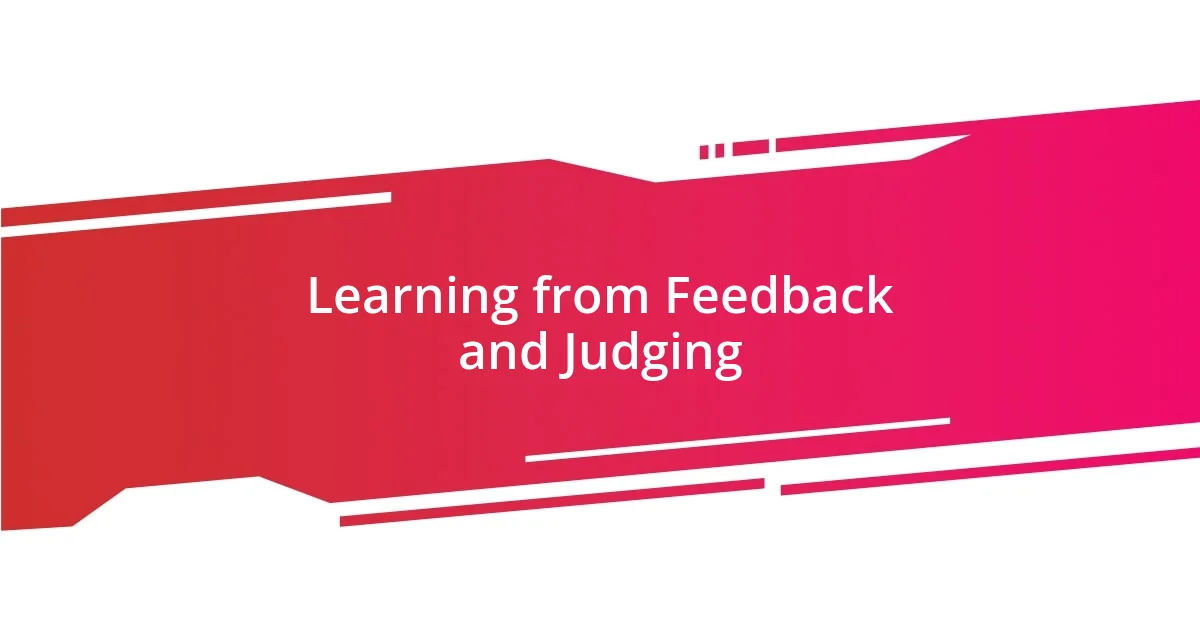
Learning from Feedback and Judging
Feedback is a treasure when it comes to growing as a writer. I recall a particularly humbling experience after submitting a short story to a contest. The judges’ comments were a mix of praise and constructive criticism. At first, I felt that pang of disappointment—who likes seeing their flaws laid bare? But as I revisited their insights, I realized that the critique wasn’t personal; it was a guide to bettering my craft. Have you ever had that enlightening moment when someone’s feedback helps you see your writing in a whole new light?
Moreover, the judging process itself can be quite revealing. I remember attending a judging panel for a local contest, where I got to witness the deliberation first-hand. It was eye-opening to hear what stood out to the judges and where they found pieces lacking. Seeing how they weighed each entry against specific criteria made me realize that every detail matters—not just in my writing, but in understanding how others perceive it. Isn’t it fascinating how the judging perspective can shift your approach to writing?
Each contest provides a unique lens through which to view your work. After one particularly stiff competition, I received a comment that changed my outlook forever. The judge mentioned that my entry felt safe, lacking the emotional depth that connected with readers. That struck a chord with me; I learned that daring to be vulnerable in storytelling can resonate far more than polished writing. Isn’t it true that sometimes, stepping outside of our comfort zones leads to the most rewarding discoveries?
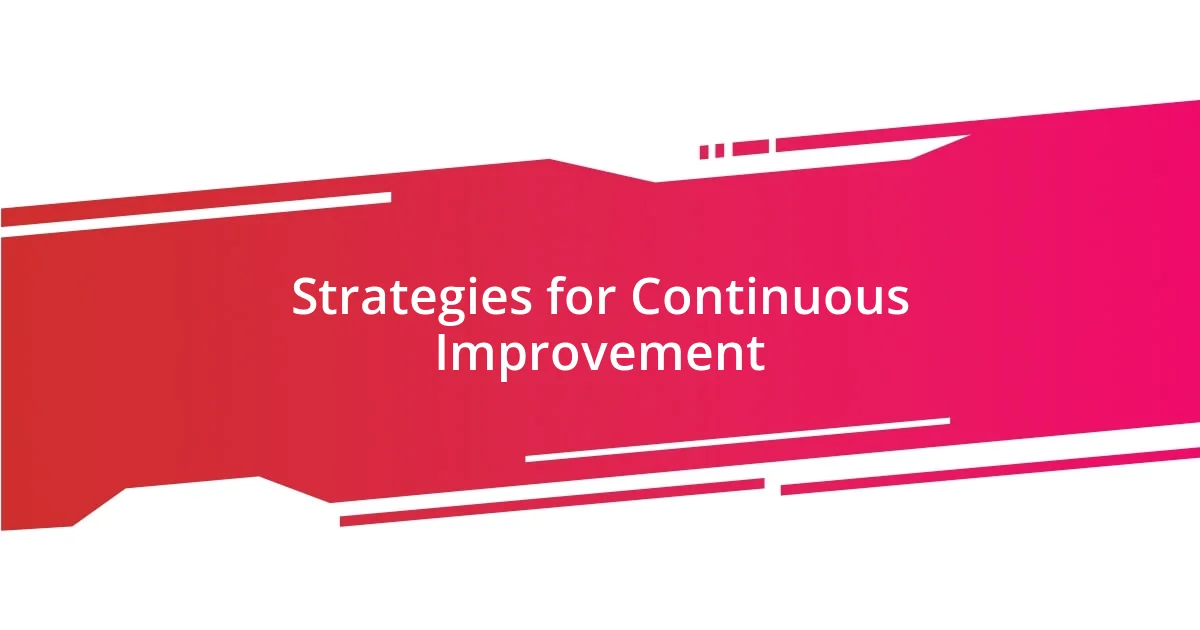
Strategies for Continuous Improvement
Finding ways to improve my writing continuously has been a rewarding journey. One strategy that I’ve embraced is keeping a journal specifically for my writing reflections. After each contest, I jot down my thoughts about what worked, what didn’t, and any feedback I received. This process allows me to track my progress over time. Have you ever noticed how reflecting on past experiences can illuminate paths for growth? It’s fascinating how looking back can shape our future endeavors.
Another technique I’ve found beneficial is setting specific writing goals after each contest. For instance, after receiving feedback that my dialogue felt stiff, I dedicated several weeks to studying dialogue in great literature and practicing through focused writing exercises. This not only sharpened my skills but kept me motivated. Have you tried setting such targets for yourself? It’s amazing how a clear goal can push you to develop areas you never realized needed attention.
Lastly, I engage in consistent reading and analysis of other writers’ work—especially those who have won competitions. I remember dissecting the winning stories from a contest that intrigued me. Analyzing the narrative structures and the emotional beats they struck opened my eyes to techniques I wanted to incorporate into my own writing. It’s like having a conversation with the author, sharing thoughts without ever exchanging words. How often do you explore others’ works to inspire your own? Reinventing your craft through the lenses of different writers can lead to unexpected breakthroughs.








